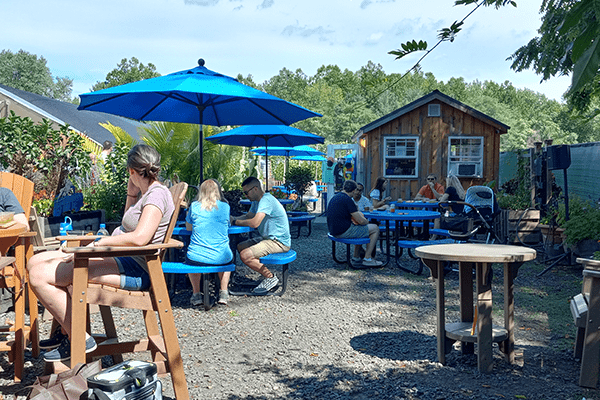|
RCBJ-Audible (Listen For Free)
|
Justice Thomas Zugibe Says Cidery Should Have Appealed To Orangetown ZBA
By Tina Traster
Rockland Cider Works is in legal limbo. The Orangeburg-based cidery, located on Van Houten Farm in Orangeburg has suffered a legal blow in court and it is unclear whether the Town of Orangetown will take action to shut it down.
A Rockland County Supreme Court decision last week rebuffed the cidery’s efforts to skirt Orangetown’s Zoning Board of Appeals in order to determine the legality of its use. At issue is whether the Van Houten Farm is legally zoned for a cidery that not only manufactures but also sells and serves hard cider. The dismissal may also affect the cidery’s liquor license with the State Liquor Authority.
In 2021, Orangetown denied the cidery’s request for a building permit and issued stop work orders. At that time, the cidery needed to appeal to the Zoning Board of Appeals (ZBA) to reverse the decision or a seek variance to operate a business that does not conform to the code. Instead, last January, the cidery took the Town to court and secured a temporary injunction allowing it to continue operating while litigation was pending.
Rockland County Supreme Court Justice Thomas Zugibe in his order wrote, the cidery “failed to exhaust their administrative remedies since they did not appeal to the ZBA the determination of the OBZPAE that the cidery operation is not a permitted use under the Town Code.” In essence, the judge said that Rockland Cider Works missed a step and needed to go to the Zoning Board before coming to court.
The cidery’s other arguments were never heard by the court. Rockland Cider Works, through its attorney Lino Sciarretta of Bleakley Platt had charged that cideries are permitted in R-40 (residential) zones as “a commercial agricultural use” even though “cideries” are not specifically listed in the zoning code. He also claimed the ambiguity in the language of the zoning code defining “commercial agricultural use” should be resolved in favor of the property owner, not the town.
The code allows for agricultural operations, nurseries, greenhouses, vineyards, and truck gardening. The court, finding the failure to appeal to the ZBA fatal, never addressed or decided any of these other arguments.
Rockland Cider Works argued the court had the authority to decide the issues, saying interpreting the zoning code was a “pure matter of law” that courts regularly decide. It also argued the court should hear the case under an “irreparable harm” exception to requiring the exhaustion of administrative remedies. And, it argued going to the ZBA would have been futile, and that when an appeal to the ZBA is futile, the court can decide the issue.
“It is hornbook law that one who objects to the act of an administrative agency must exhaust available administrative remedies before being permitted to litigate in a court of law,” wrote Justice Zugibe, citing numerous authorities for this basic legal principle, while noting that none of the exceptions to the rule applied in this case.
What happens next is up to the town. It can pick up where it left off by enforcing the Stop Work Orders or it can attempt to shut the cidery down. It could seek daily fines for the continued operation. Or it could amend the zoning code to allow for a cidery at that location. Or it could do nothing and allow the popular cidery to continue operating.
“In light of the court decision, the order that was issued by the Director of OBZPAE, Jane Slavin, directing Rockland Cider Works to stop the use (sale of alcohol for on-site consumption) stands,” said Orangetown Supervisor Teresa Kenny. “I don’t believe the decision requires any action from the Town Board at this point, but we will be speaking with Ms. Slavin this week to see how the decision impacts what her office will be doing moving forward.”
The cidery also can appeal the court’s order to a higher court. It could reapply for a building permit, and if denied again, appeal the decision this time to the ZBA, or it could seek a variance from the ZBA, allowing it to continue operating. Another option is to pick up where it left off and seek a zoning text amendment, clarifying that cideries are “commercial agricultural uses” which, if granted, would allow it to operate at its location on Sickletown Road “as a matter of right.”
Counsel for the cidery said, “We disagree with the decision and plan to exercise our rights on appeal; the court did not resolve the crux of the issue – namely, that the cidery is a permitted commercial agricultural operation.”















